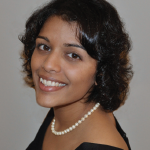Q: What would you tell the next generation of students to focus on?
A: We should get back to the notion of being selfless. You’re there to serve. I would tell them they really need to listen to their patient, because the patient will tell you what’s wrong. And if you listen to them—really listen to them—you’ll understand what’s wrong with them from a diagnosis standpoint, and you’ll also find out what will make them better.
ACR Distinguished Fellow Awards
 Renuka Nayak, MD, PhD
Renuka Nayak, MD, PhD
Clinical fellow, Division of Rheumatology, Microbiology & Immunology, University of California–San Francisco (UCSF)
Background: Melding her interests in biology, computer science and human genomics, Dr. Nayak is carving out a rather unique research focus. “I really enjoy the process of analyzing large data sets to better understand what’s going on with patients or biology,” she says.
She has studied under some of the best and brightest, fast-tracking into rheumatology fellowship at UCSF, where since 2015 she’s studied the role of microbiomes in methotrexate treatment. Using in vitro microbiology, patient samples, gnotobiotic mice and high-throughput sequencing, she’s investigating the mechanisms by which our “second genome” affects patient treatment.
Among her honors, she has received the UCSF Resident Research Award, the Keystone Symposia Future of Science Fund Scholarship and a Rheumatology Research Workshop award. Rheumatology, she says, “Is not a cut-and-dried discipline. You always have to keep an open mind, pay attention and ask good questions.”
‘For researchers, the future is a bit scary because of the funding environment.’ —Dr. Nayak
Q: What’s the most fulfilling aspect of your work?
A: Watching my patients get better. It’s one of the nicest things about rheumatology. Many have seen doctor after doctor without a diagnosis, and then they come to us. We can provide them a diagnosis, treat them and watch them get better. That’s tremendously fulfilling.
Q: What are the biggest obstacles you face as a rheumatology fellow?
A: For researchers, the future is a bit scary because of the funding environment. I spend a good amount of my time trying to obtain funding for the research I want to do. That has been challenging. Living in San Francisco, [an incredibly] expensive city, I’m now undertaking the challenge of starting a family and figuring out how to make this work.
Q: What is the elevator speech for your research interests?
A: I’m trying to understand how the bacteria that live in and on us can metabolize the drugs we give to our patients, and whether that may affect how our patients respond to the drugs. I am interested specifically in methotrexate; we know it works for some people and causes side effects in others. But we don’t know why.



